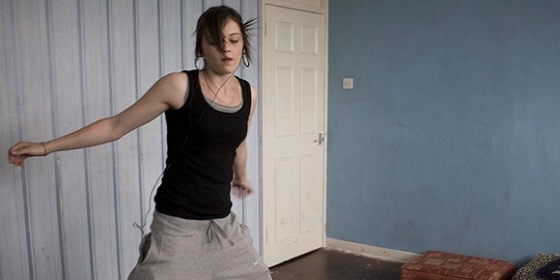
For those accustomed to defining their personhood solely in relation to the mind, a rupture in the body can come as an indelible shock. Such is the devastation that opens Catherine Breillat’s 2014 film Abuse of Weakness. In a composed overhead shot that begins with a painterly expanse of abstracted white forms, Breillat widens our line of vision to reveal feet shifting under the weight of cozy bed linens and the marble-skinned hands of our slumbering protagonist, Maud Shainberg (Isabelle Huppert). In the throes of a stroke triggered by a cerebral hemorrhage, Maud grasps at her right arm in an effort to regain lucidity, pushes herself out of bed and attempts to stand erect. Her frail physique falters, leaving her nude and recumbent, pinned under a gold-framed chair.
In the hospital, struggling through physical therapy and receiving visitors, Maud’s biographical details begin to emerge. An associate brings news of securing funds in Cannes for Maud’s next film; later we see that she has a fleet of loyal assistants and an office outfitted with slick computer monitors and decorated with a poster for Pasolini, mort d’un poète (1995). She’s written a book featuring a photo of herself on the cover in a serious pose. She has adult children, financiers, and enough success as an auteurist filmmaker that she is able to put her home, outfitted with bourgeois furniture and a well-stocked library, on the market for a cool million.
As with many of her prior works, Breillat adapted the premise of Abuse of Weakness from events in her own life, which in this instance began with her 2004 stroke and ended a few years later with the loss of 700,000 euros at the hands of a well-known con artist, Christophe Rocancourt. Rocancourt had done time for fraud after posing as a French aristocrat, running scams while partying at the Playboy Mansion and hobnobbing with Mickey Rourke and Jean-Claude Van Damme. Breillat found his reputation and public demeanor appealing, and pursued him to play opposite Naomi Campbell in an adaptation of her 2007 novel Bad Love. Needless to say, the film didn’t get made. Rocancourt is refigured in Abuse of Weakness as Vilko, a hard-bodied, cold-blooded charmer rendered with brute confidence by rapper Kool Shen. His first appearance—on a TV talk show, shilling his memoir while Maud, during one of her many rest periods, is curled up in bed—seems almost like a specter out of a dream. Her infatuation with him is immediate, and she smiles as he explains to program’s host, “I preyed on idiots who were smarter than me. I preyed on their vanity.” When the two first meet in the flesh at Maud’s home, it’s tempting to wonder at what exact moment Vilko begins casing the joint.

When I interviewed Huppert about her work on this film for a story in Interview, she noted: “In the dramatic roles I’ve done, there is something that ties them to one another in the sense that they’re all survivors—not necessarily winners, more like winning victims.” [i] Victimhood, as well as its tangled manifestations, is a keenly important theme for Breillat, as is unpacking the modes of sexual brutality. Her decision to contextualize Maud as a director is not just clever, but critical. In life, as in her work, Maud is used to getting the final cut. She is an alpha type accustomed to total control, and she just doesn’t enjoy being in charge, she relishes it. Breillat uses images of Maud recuperating in bed—deep under the covers half asleep, or drowsily talking on her mobile phone—as a recurring visual motif, signalling that while Maud is acutely aware of her physical weaknesses, her judgment of her mental faculties is supremely overestimated. The issues with her body are a tangible ordeal that must be overcome, but the amorphous state of her mind is a slipperier beast, a vulnerability that she hardly seems aware of. Confronted with Vilko, another alpha, their chemistry is combustive. Abuse of Weakness is a sexual thriller without intercourse, a slow-burning S&M fable about the nature of power. It’s also a sick fairy tale (another specialty of Breillat’s) about dependency, and perhaps most harrowingly, an examination of the fleeting moments of unknowingly giving away one’s life.
Though Abuse of Weakness grapples with sexual dominance, it eschews the corporeal cruelty of much of Breillat’s previous oeuvre—Fat Girl’s (2001) bloody conclusion, or the hard core erotics of Anatomy of Hell (2004)—and focuses instead on her real concern: power. Breillat’s nimble use of dialogue drives the point home. Maud is called “perverse” for wanting to work with a criminal; Vilko’s constant barbs when trying to elicit cash—“you like to humiliate men”; “now I’m your slave”—are attempts to guilt her into submission. But Breillat also makes light of her obsession with power dynamics, as when Maud is being fitted for an orthopedic boot and insists on designing her own version in black with Velcro and studs, explaining, “The disabled need an S&M look.”
The issues with her body are a tangible ordeal that must be overcome, but the amorphous state of her mind is a slipperier beast, a vulnerability that she hardly seems aware of.
Vilko’s most seductive trait is that he offers himself up to Maud not only as a pawn for her to play with—an actor—but also as an object, pure material. She expects to indulge him to a certain extent while subordinating him to her needs as an artist and creator. She’s barely conscious of how her association with an admitted con artist puts her at risk; all she sees is the fun of the artistic courtship and a new vessel for her ideas. Vilko’s enough of a parasitic predator to seize the opportunity, especially when confronted with her deteriorated health. They’re constantly together and he inserts himself into all aspects of her life, lifting her into cars, feeding her, letting her lean on him as they descend an escalator. When she first writes him a cheque (50,000 euros for a “loan”), she does so grudgingly, as a one-time favour for a friend. Maintaining, in her mind, her position as the dominant in their relationship, Maud persists in her largesse and allows the loans to snowball. Finally, after putting her house up as collateral for a massive cash advance, during a visit to Vilko’s over Christmas she sees his wife unwrap a brand new designer purse and realizes where the money is flowing. A few days later, when he shows up at her home late at night and tries to sleep in her bed, Maud, in a ratty kimono, banishes him to her kids’ childhood bedroom. By the time he shows up again, asking for a handout, she’s hatched a plan to get the money back. Breillat adapted Charles Perrault’s Sleeping Beauty in 2010, but Abuse of Weakness, with its slumbering director-princess awakened too late and calculating, invasive charming prince, is a juicer version of the tale.
It’s impossible to know whether Breillat considers this film an act of revenge. She has said that the day she first met Rocancourt was the worst day of her life. But after exorcising the experience in a novel and this film, it’s undeniable that she has regained the upper hand. Likely the most unnerving part of her brush with a career criminal was the dissolution of her sense of self, an identity she was able to partially rebuild by transforming her trauma into an object of cinema. The film’s concluding scene, an immaculately staged summit between Maud, her children, friends, and colleagues, places Maud in front of a silk backdrop, stoically facing the hard facts of her financial ruin. “I knew I had to stop, but I didn’t care,” she says. “It was me, but it wasn’t me.”





